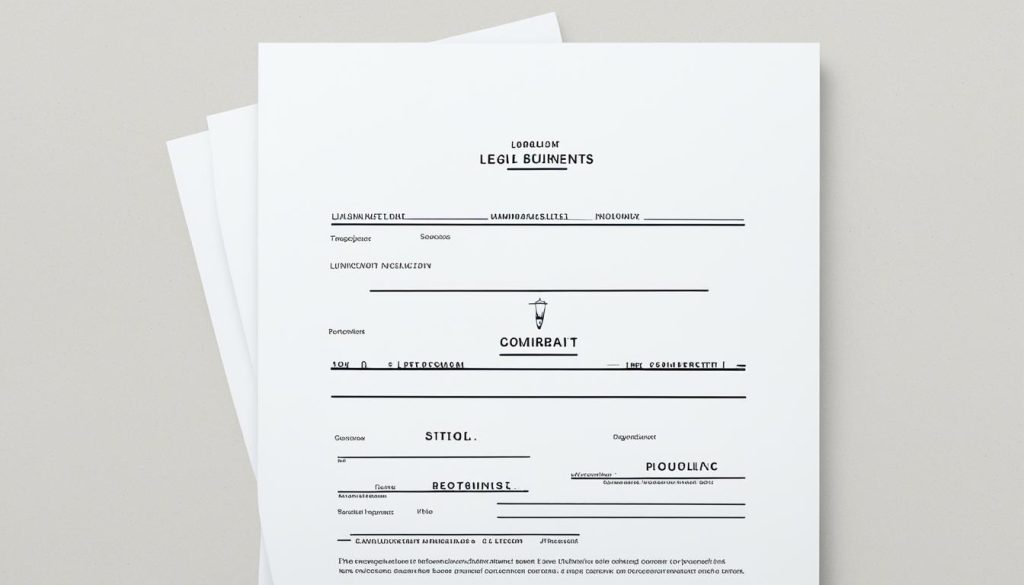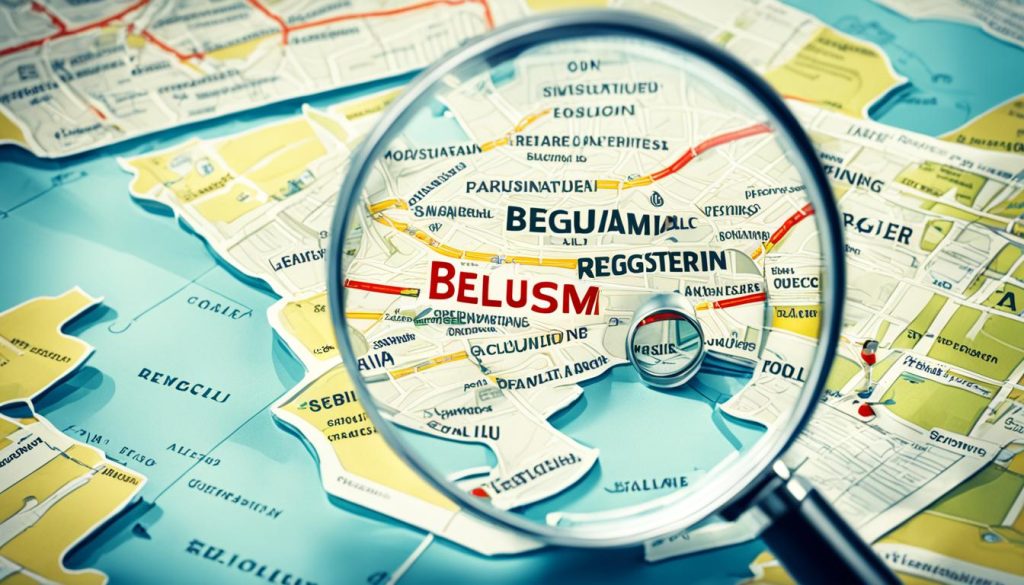When starting a company in Belgium, a proper plan is key. You need to know the vital steps and legal stuff to avoid problems. Our checklist will guide you through everything. From setting up your business to hiring employees, we’ll make sure you’re ready for the future.
Beginning a business in Belgium means following specific steps. You start by registering your company. This is done at the Crossroads Bank for Enterprises. Then, you must register for VAT for tax reasons. Joining a Social Insurance Fund is next, to meet social security laws. And if you’re going to have employees, you’ll need to register as an employer too.
Business Counters, or “guichets d’entreprises,” make these tasks easier. They help you meet EU Services Directive requirements. For self-employed individuals, certain rules apply. You must be at least 18, legally able to work, and have the right residency or citizenship. In Wallonia, it’s also necessary to show you have business skills, through your degree or past work.
Key Takeaways
- Initiating a business in Belgium involves incorporation and registration with the Crossroads Bank for Enterprises.
- VAT registration is critical for taxation purposes.
- Affiliation with a Social Insurance Fund is mandatory.
- Employer registration is required if hiring staff.
- Business Counters can significantly facilitate the administrative process.
- In Wallonia, proof of entrepreneurial ability is a prerequisite.
Legal Requirements for Starting a Business in Belgium

To start a business in Belgium, you must follow several key steps. First, pick a unique name for your business. Then, prepare the official papers, including drafting statutes. These documents need to be authenticated by a notary.
Next, you must register with the Crossroads Bank for Enterprises (CBE). This gives your business an official identity and a unique number. It’s crucial for all your paperwork. You also need to register for Value Added Tax (VAT) to comply with Belgian tax laws.
Joining a Social Insurance Fund (SIF) is another important step. It makes sure you have social security coverage. Companies must also register as an employer and legally declare their staff.
Business Counters (Guichets d’Entreprises) offer help with these procedures. They make it easier to understand and follow Belgian business law. They guide you in registering your company in Belgium the right way.
Some jobs might need extra compliance steps. You may need to show you’re qualified according to Belgian law. This ensures individuals in regulated professions are rightly skilled.
In summary, knowing and following Belgium’s legal requirements for business startup is crucial. Following these steps correctly sets your company up for success. It ensures your business is legally sound in Belgium.
Understanding Business Culture in Belgium

The Belgian business environment values formality and structure. Businesses in Belgium place great importance on hierarchy and titles. These elements are crucial for good working relationships and smooth communication at work.
Belgium is proud of its open economy, which promotes innovation and teamwork. In vibrant places like Brussels, the entrepreneurial culture in Belgium is really alive. Many start-ups and entrepreneurs are changing the business world, supporting economic growth with their fresh ideas.
A key feature of Belgium’s business scene is the role of SMEs in Belgium. Small and medium-sized enterprises are the backbone of the economy. They create jobs, support communities, and keep the local economy stable. Their success shows how important it is to be adaptable, resourceful, and well-connected in Belgium.
Knowing the ins and outs of the Belgian business environment is vital for success. It doesn’t matter if you’re an experienced entrepreneur or just starting out. Understanding and respecting Belgian business customs can help you build strong relationships and succeed in business.
Professional Qualifications Needed

It’s key to understand the value of professional credentials in Belgium, especially for specific job fields. When these accreditations are from abroad, Belgium has clear rules to check if they are up to standard.
Recognising Overseas Qualifications
People from the European Economic Area (EEA) benefit from a mutual recognition system. Directed by Directive 2005/36/EC, it allows EEA-obtained qualifications to be accepted across the area. This means a French engineer can work in Belgium with their existing qualifications.
Regulated Professions
In Belgium, some jobs have strict entry requirements. This usually involves showing your qualifications through diplomas or experience. Places like Brussels and Wallonia ask for detailed proof of skills.
Sometimes, additional tests are needed to fully match Belgian standards.
Choosing Your Business Structure

Deciding on a business structure in Belgium is a key step. The choice affects your personal risk, taxes, and legal standing. Each option comes with its own set of rules.
Sole Proprietorship
Many entrepreneurs go for a sole proprietorship. In Belgium, this means you run everything but also take all the risks alone. It’s less complicated to manage, making it good for single-person businesses.
Partnership
Thinking of starting a partnership? Belgium offers general and limited types, affecting financial and legal duties. General partnerships mean sharing everything, including full liability. With limited ones, the risk depends on how much you invest.
Limited Liability Companies
LLCs in Belgium protect your personal assets better than some other forms. Your risk is limited to what you’ve put into the business. It’s ideal for businesses looking to expand and bring in investors.
Obtaining the Necessary Permits and Authorisations
Starting a business in Belgium needs careful planning. This is especially true when it comes to getting business permits in Belgium. You may need specific authorisations depending on your business type to comply with regulations fully.
First, visit the start.business.belgium.be website. It has all the details on permits and documentation needed. This site is a great help to find out which permits you need and how to apply for them.
- Find out which permits your business needs.
- Collect all required documents, like proof of qualifications and insurance. Proper documentation is essential for compliance.
- Apply for your permits via the channels mentioned on the start business Belgium website.
- Wait for the Belgian authorities to assess and approve your application.
Make sure to follow Belgian regulations closely to avoid delays. Keep every document and communication you have with authorities. This will help maintain your business records.
Following these guidelines carefully will help you through the permits process. Remember, meeting the requirements is key to starting a legal and thriving business.
Registering with the Crossroads Bank for Enterprises

Before you start your business in Belgium, knowing about the Crossroads Bank for Enterprises is key. This registration gives your business a special number. It combines VAT and social security IDs, making sure your business runs smoothly and legally.
Steps for Registration
Getting registered with the Crossroads Bank in Belgium is made simple for business owners. You start by visiting a designated office for electronic registration. Here’s what you need to do:
- Choose a business name that meets Belgian laws.
- Hand in the documents needed to legally set up your company.
- Fill out the electronic form at the designated office.
Obtaining a Company Number
Once you successfully register with the Crossroads Bank, you get a unique Belgian company number. This number is crucial because it’s used for VAT and social security. It officially lists your business in the Belgian registry. This is a must for trading legally and effectively in Belgium.
Registering with VAT Authorities

When you run a business in Belgium, following VAT compliance Belgium rules is key. If your company sells goods or provides services with VAT, you need to register. This means taking certain steps to follow the Belgian tax system rules.
To meet VAT compliance Belgium, firms should check their activities to see if they’re VAT-liable. Any company with taxable sales must sign up with the Belgian tax system. Keeping records and filing VAT returns regularly are part of VAT registration Belgium requirements.
First, you complete the necessary paperwork. Then, you send it off to the VAT authorities for their okay. When you get the thumbs up for VAT registration Belgium, they give you a unique VAT number. This number is a must for trading and appears on all VAT-related invoices and documents.
Not following the Belgian tax system rules can lead to fines. So, it’s important for companies to know what they must do to stick to VAT compliance Belgium standards.
- Determine if your business activities are subject to VAT.
- Complete the necessary VAT registration forms.
- Submit the forms and await approval from the tax authorities.
- Receive your VAT identification number.
- Ensure all transactions and records comply with VAT regulations.
Sticking to these steps helps businesses operate smoothly under the Belgian tax system. It ensures they fully meet VAT compliance Belgium rules.
Membership of a Social Insurance Fund

Being self-employed in Belgium means you must join a Social Insurance Fund Belgium. This is key to sticking to local laws. It helps with Belgium social security and handling your self-employed social contributions. These funds are designed to offer you benefits that matter.
Choosing a Social Insurance Fund
It’s crucial to pick the right Social Insurance Fund Belgium. Different funds have various benefits. Look into what they offer and compare them. Check their reputation, customer service, and benefits that match your needs.
Registration Process
Signing up with a Social Insurance Fund Belgium is easy but a must for the self-employed. You need to fill out a form and show you are self-employed. It’s also a good idea to join a health insurance fund for full coverage.
By joining the right fund, you follow Belgium social security laws and protect your future. Organising your self-employed social contributions brings peace of mind. It helps greatly when you need support.
Registering Your Business as an Employer

When you start a business in Belgium, registering as an employer is a key step. It’s crucial for following Belgian employment regulation. This ensures your company meets all legal hiring requirements.
Before hiring your first employee, you must register your business as an employer. You’ll need to submit various forms and documents. This is to comply with the labour laws. Doing so makes your business operations smoother and formally recognises you as an employer.
- Filling out and sending off employer registration forms to the right places.
- Providing details about your employees and their job terms.
- Making sure your company follows Belgian work rules, including those about taxes and social security.
- Getting a confirmation that says you can legally hire in Belgium.
Keeping up with Belgian employment regulation helps your business run without glitches. It ensures you’re hiring legally and ethically. This boosts your reputation as a fair employer in Belgium.
Submitting an Employment Declaration

Hiring employees in Belgium means you must complete several important tasks. At the top of the list is the Belgium employment declaration. This is vital for making the recruitment of staff official. It helps you stick to the local employment laws. Overall, this declaration is a must-do and a big part of getting your team set up legally.
To make the process smoother, Belgium’s authorities have laid out some steps for employers. These steps are there to help manage how you hire people and to protect both you and your future employees. It’s necessary to submit this declaration before your new employee starts working.
Here’s a quick guide to submitting a Belgium employment declaration:
- Gather Required Information: Start by collecting important details. You’ll need the employee’s personal info, the day they’ll start, and what their job will involve.
- Utilise Online Portals: You can submit this info through online portals from Belgian employment offices. This makes everything more efficient.
- Confirm Compliance: Make sure all the information you provide follows Belgian employment rules. This keeps you out of trouble.
Following these steps helps your business run smoothly in terms of hiring. It’s very important for anyone looking to employ staff in Belgium to get their declaration submitted on time.
Starting a Business as a Foreigner in Belgium
Belgium is welcoming to foreign business people. But, they need to follow specific steps to align with local laws.
EU/EFTA Nationals
For those from the EU and EFTA, starting up in Belgium is easier. They enjoy the freedom to set up without needing a visa or Belgian professional card. They must handle common business tasks and sign up with the Crossroads Bank for Enterprises.
Non-EU/EFTA Nationals
Non-EU/EFTA nationals have extra steps. They need a Belgian professional card, which is a work permit and business license. They can apply for this card at Belgian embassies or consulates back home.
They might also need a visa to enter and live in Belgium. Plus, they have to show they have business skills and know-how. This depends on where in Belgium they plan to start their business. Making sure they have the right documents and skills is key for a smooth start in Belgium.
Temporary and Occasional Provision of Services
Businesses from EU countries can offer their services in Belgium temporarily. This lets companies reach out to new markets without a long-term base in Belgium. It’s a great chance for firms to try out new areas or carry out short projects.
But, it’s important to know that Belgium checks how these services are provided. Even though services can cross into Belgium, companies must follow the specific rules for their activities. Understanding these rules is key to use these chances well.
Also, offering services in Belgium means firms must handle certain paperwork and follow the local laws. They might need to register with Belgian authorities or get their qualifications recognised. Doing this helps avoid legal problems and lets companies focus on offering good services. Following the Services directive in Belgium makes things easier and builds trust in international business.







